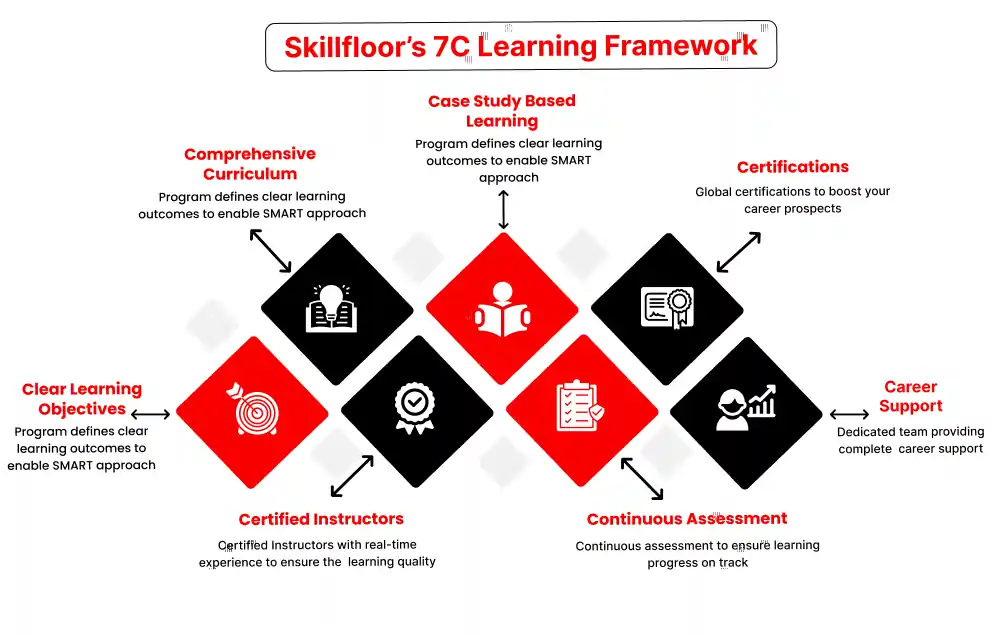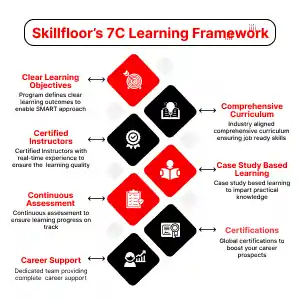

SkillFloor's Development course is precisely designed to provide pupils with thorough training in the dynamic field of development. This course, designed to suit beginners and seasoned professionals, focuses on imparting expertise in core skills required for understanding the various circumstances associated with software development. Participants gain a comprehensive understanding of development processes through a combination of theoretical education and practical experience. These topics range from fundamental programming principles to cutting-edge technologies.
SkillFloor's Development course, which focuses on hands-on learning and practical application, provides learners with the knowledge and competence they need to manage the various issues that arise throughout software development projects. This course, which covers a wide range of topics such as coding languages, version control systems, and software architecture, encourages the development of fundamental problem-solving abilities as well as a strong awareness of the continual iteration of development processes. Whether you want to start a career in software development or expand your skill set, SkillFloor's Development course provides a flexible and comprehensive learning experience designed to meet the changing demands.


Understanding Development Theory: You'll delve into the foundational theories and concepts behind development, exploring ideas from leading scholars and practitioners.
Case Studies: Learning through real-world examples allows you to see development principles in action. Case studies provide insights into successful and challenging development projects around the world.
Project Management Skills: Development courses often emphasize project management techniques tailored to the unique challenges of development work, including resource allocation, stakeholder engagement, and risk management.
Data Analysis and Research Methods: You'll learn how to collect, analyze, and interpret data relevant to development projects, equipping you with valuable research skills for evidence-based decision-making.
Cross-Cultural Communication: Effective communication is essential in development work, especially when working across diverse cultural contexts. Development courses often focus on enhancing your intercultural communication skills.
Sustainability and Resilience: Sustainable development is a key focus, with an emphasis on creating long-term solutions that promote economic, social, and environmental well-being. You'll explore strategies for building resilience in communities facing various challenges.
Policy Analysis and Advocacy: Understanding policy frameworks and the political dynamics shaping development is crucial. Development courses often cover topics such as policy analysis, advocacy strategies, and the role of international organizations.
Technology for Development: You may learn about innovative technologies and digital tools used to address development challenges, such as mobile apps for healthcare or blockchain for financial inclusion.
Fieldwork and Internships: This practical experience allows you to apply classroom learning in real-world settings and gain valuable insights into the complexities of development work.
Networking and Career Development: Development courses often provide opportunities to connect with experts, alumni, and organizations working in the field, helping you to explore career paths and opportunities for collaboration.


Upon successful completion of our Development Courses, you will be certified as a proficient Data BASE Developer, Android App Developer, IoS App Developer, Flutter Developer, and Front End Developer. This certification validates your expertise in each respective field, equipping you with the skills and knowledge necessary to excel in the dynamic world of software development. Whether you're delving into database management, crafting innovative Android or iOS applications, mastering Flutter for cross-platform development, or creating engaging user experiences as a Front End Developer, this certification recognizes your dedication and proficiency in these essential domains. With this comprehensive certification, you'll stand out in the competitive landscape of development and open doors to exciting career opportunities.


Professional Growth: Enrol in a development course to improve your abilities and access prospects for professional growth in the quickly expanding software development industry.
knowledge: Acquire the knowledge of programming languages, frameworks, and tools needed to create creative software solutions in a variety of fields.
Versatility: Increase the scope of your employment options by developing abilities that can be used in a variety of development domains, such as game, mobile, and web development.
Skills for Solving Problems: Develop your critical thinking and problem-solving skills to take on challenging tasks and use code to provide efficient solutions.
Practical Experience: Apply theoretical principles through project-based learning in order to construct a portfolio that highlights your development competence.
Opportunities for Collaboration: Work on development initiatives with colleagues and business experts to gain knowledge and expand your network.
Keep Up: Enrol in courses that provide up-to-date material and useful insights to stay on top of changing industry trends and technologies.
Entrepreneurial Goals: Develop the abilities required to create your own freelance company or software startup, providing clients and customers with cutting-edge solutions.
Industry Acknowledgment: Obtain qualifications and certificates that are accepted by employers to prove your competence and reliability as a developer.
Personal Development: Develop important soft skills including cooperation, communication, and time management. These are necessary for success in the lively software development industry.
